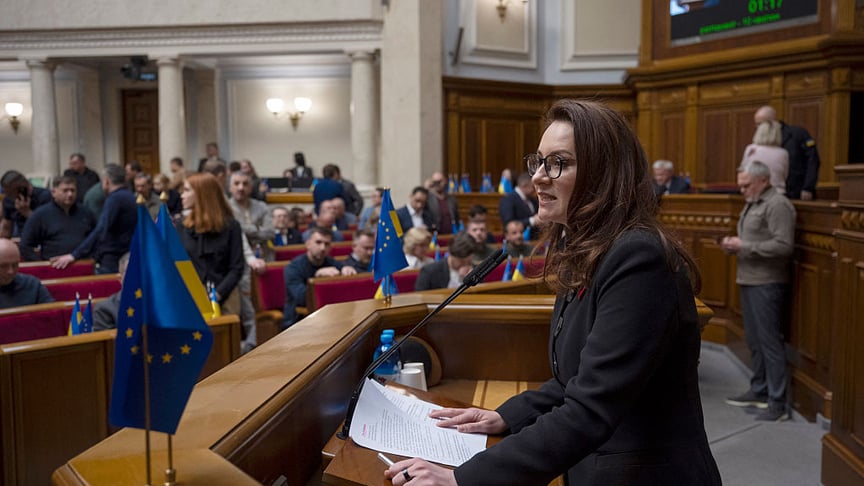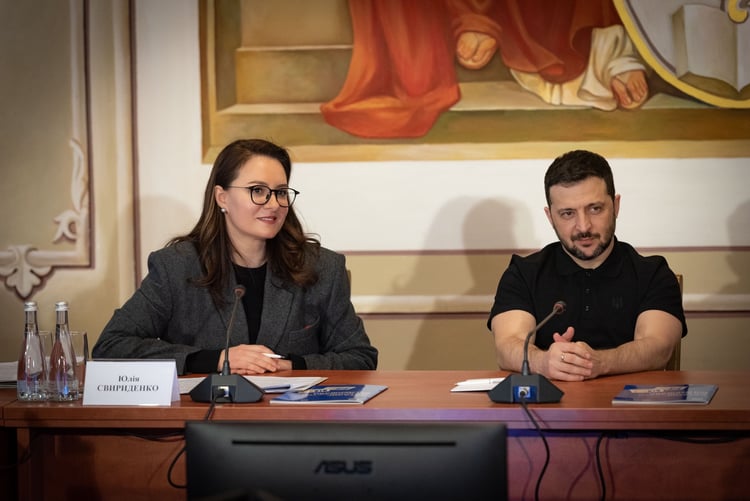Yermak’s deputy and reliable executor: What to expect from PM Yulia Svyrydenko

The saga of replacing Prime Minister Denys Shmyhal has been simmering since 2024 and is finally over. Yulia Svyrydenko, the former minister of economy, took his place. Why is she seen as the new head of the Cabinet of Ministers, and how will this affect Ukraine’s future? hromadske investigates.
Why revamp the Cabinet?
In recent weeks, several media outlets reported that the former head of government, Denys Shmyhal, might resign, with Yulia Svyrydenko slated to replace him. On July 14, President Volodymyr Zelenskyy officially proposed that she lead the Cabinet and present her action plan.
“If we assess the results of Denys Shmyhal and his government, we see systemic problems,” political scientist Oleksii Koshel told hromadske.
He pointed to legislative shortcomings: during the war, parliament rejected roughly two-thirds of government-proposed bills. This is a catastrophic statistic, according to Koshel.
Koshel also highlighted issues with military-related legislation drafted by the Cabinet, noting that the government “systemically and chronically lagged in decision-making.” As an example, he cited changes to mobilization laws: “They were delayed by at least one and a half to two years. They should’ve been passed in 2022, not spring 2024.”
Despite Shmyhal serving as prime minister longer than anyone in independent Ukraine’s history—over five years—he’s also a “record holder for ‘grayness,’ lacking a distinct political image or initiative,” says political scientist Yevhen Magda.
“I can’t say he messed up. It’s just that nothing depends on him. Decisions aren’t made in his office. That’s it. His long tenure only shows he’s a calm person. A phlegmatic or melancholic,” Magda told hromadske.
[Denys Shmyhal] has proven himself neither independent nor ambitious. So, he can’t have an independent political future. Maybe we’ll see him on the Servant of the People party list in the next elections, but I, for one, highly doubt it.Oleksii Koshel, political scientist, head of the Committee of Voters of Ukraine
What to know about Svyrydenko?
Born in Chernihiv, Svyrydenko graduated with honors from Kyiv National University of Trade and Economics, later pursuing postgraduate studies in “economics and national economic management.”
After her education, she stayed in Kyiv, working as an economist at a company. In 2011, she moved to the city of Wuxi in China, as head of Chernihiv’s permanent representation, fostering Chinese investment in her hometown and connecting local entrepreneurs with Kyiv partners.
In 2015, Svyrydenko began her civil service career as an advisor to the head of the Chernihiv Oblast State Administration, then led by Valeriy Kulich of the Petro Poroshenko Bloc. Two years later, she became the administration’s first deputy head.
From July to November 2018, she served as acting head. A year later, she joined the Ministry of Economy, first as a deputy, then, from 2021, as its head.
How did Svyrydenko get close to the President’s Office?
In December 2020, Andriy Yermak, head of the President’s Office, replaced his deputy Yulia Kovaliv with Svyrydenko, already known as a reliable executor. In this role, she handled economic issues, investor relations, and led a council to support Ukrainian businesses, established by President Zelenskyy.
According to Ukrainska Pravda, citing various sources, Svyrydenko was tasked with overseeing multiple areas: economy, finance, agriculture, energy, ecology, subsoil resources, and parts of defense and social policy. This proximity to the president made her a prominent figure. When the need for a new economy minister arose in fall 2021, she was the top candidate and assumed the role in November.
Much of her tenure as economy minister coincided with Russia’s full-scale war against Ukraine. Under these conditions, Svyrydenko launched a business relocation program that preserved 35,000 jobs, created an employment program for internally displaced persons, and introduced compensation payments for employers hiring them.
Svyrydenko is also remembered for pushing tax hikes in 2024 to raise an additional $500 billion for security and defense. The law increased the military tax to 5%, raised taxes for certain categories of sole proprietors, and imposed a 25% profit tax on non-banking financial institutions.
She also championed economic reservation policies. In September 2024, she called it the Ministry of Economy’s second priority, noting it could generate 100 billion hryvnias ($2.49 billion) for the state treasury.
Her latest major achievement as economy minister was signing an agreement with the United States on rare earth minerals. Initially planned for February, delays followed tensions between Zelenskyy and the U.S. administration. On April 30, 2025, Svyrydenko and her American counterpart, Scott Bessent, signed the deal to create a Reconstruction Investment Fund. Ukraine has already allowed private investors to mine lithium from the state-owned Dobra deposit in Kirovohrad Oblast.
Ukrainska Pravda reports that Svyrydenko appears fully loyal to the President’s Office. Sources say she “never annoyed Zelenskyy with ‘why?’ questions, only asking ‘by when?’”

What to expect from the new government?
Political scientist Oleksii Koshel believes the government reshuffle is unlikely to bring new managerial quality or faster decision-making, and the Cabinet’s core operations will remain unchanged. However, he notes that such a rotation could yield minor political benefits, as “new faces and fresh blood are always well-received by voters.”
There’s reason to say Yuliia Svyrydenko has more managerial experience than Denys Shmyhal, who came to the prime minister’s role from business, where he led only a mid-level segment of a large structure. But the main criterion here isn’t professional experience—it’s loyalty to the President’s Office. And Ms. Svyrydenko has repeatedly shown that loyalty publicly.Oleksii Koshel, political scientist, head of the Committee of Voters of Ukraine
Political scientist Yevhen Magda agrees that the President’s Office is appointing a loyal figure to lead the government. He, too, believes the reshuffle won’t change much.
“For radical changes, the war needs to end, and the economy needs to normalize. Today, we live on Western money because, naturally, all our funds go to defense,” he added.
Predicting how the new government will interact with international partners is tricky. Koshel suggests the Cabinet changes are unlikely to affect relations with partners but notes, “It’s clear there will be specific preferences, say, regarding the appointment of the defense minister or perhaps the foreign minister.”
Meanwhile, Magda points out that since these changes are happening during a week-long visit by U.S. special envoy Keith Kellogg to Kyiv, the President’s Office likely has certain expectations.
“I’d put it this way: there won’t be radical changes. But, you know, there’s that old Soviet joke: ‘There won’t be a war, but there’ll be such a fight for peace that no stone will be left unturned,’” the expert concluded.
- Share:


